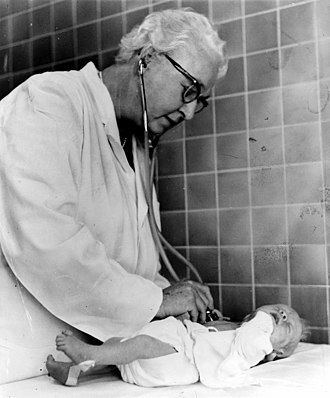Without a Woman: Virginia Apgar Has Saved Millions of Babies...and Counting
- iWomanTV

- Aug 20, 2025
- 2 min read
Every newborn baby in hospitals around the world has something in common: their very first “test” in life is thanks to a woman named Dr. Virginia Apgar.
Before 1952, doctors had no standardized way to measure how well a baby was adjusting to life outside the womb. Dr. Apgar, an anesthesiologist and researcher, changed that with the creation of the Apgar Score. This simple yet revolutionary system evaluates five signs of a newborn’s health: heart rate, breathing, muscle tone, reflexes, and skin color. Within minutes of birth, doctors could now quickly determine whether a baby needed urgent care, saving countless lives in the decades since.
Born in 1909, Apgar was determined to be a doctor by the time she graduated high school. Despite graduating near the top of her class from Columbia University’s medical school in 1933, she was discouraged from pursuing her dream of becoming a surgeon, simply because she was a woman. Instead, she was steered toward the less respected field of anesthesiology. Apgar entered the specialty and took it to new heights in no time. By 1949, she had become the first woman to hold a full professorship at Columbia University’s College of Physicians and Surgeons.

Her work in obstetrical anesthesia laid the foundation for her signature achievement. In 1953, she published her method for scoring infants at one minute and five minutes after birth. Despite initial skepticism, the Apgar Score became a global standard. Today, it remains one of the most widely used medical assessment tools in the world.
Virginia Apgar didn’t stop there. Later in her career, she shifted her focus to public health, becoming a leading advocate for preventing birth defects through education and research funding. At the March of Dimes, she raised awareness and resources that continue to support mothers and babies worldwide.
Dr. Apgar’s legacy is immeasurable. Thanks to her, millions of newborns have received life-saving care in their first fragile moments.
So, what wouldn’t we have without Virginia Apgar? Quite simply: a universal language for newborn health that has saved lives, improved care, and given babies around the world a stronger start in life.



Новинний портал Delo.ua пропонує свіжі новини про криптовалюту https://delo.ua/tags/kriptovaljuta/, тут можна дізнатися про ринкові тренди і важливі події. Портал публікує огляди та аналітику для тих, хто цікавиться цифровими валютами. Користувачі знаходять корисну інформацію про курси, інвестиції і законодавчі зміни. Delo.ua оперативно інформує про нові технології у світі крипти. Це надійне джерело для трейдерів і новачків. Портал постійно оновлюється, щоб читачі були в курсі останніх подій. Тут можна знайти поради від експертів і новини про криптобіржі. Delo.ua допомагає краще розуміти світ криптовалют.